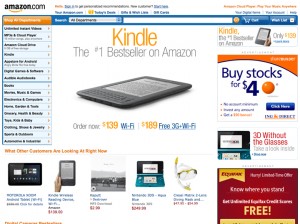By Daniel C. Houston
Reporter
Amazon and other online retailers could soon see their exemption from collecting the Texas state sales tax evaporate if a bill in the Texas House of Representatives becomes law.
H.B. 1317, which would require all online retailers to pay the sales tax if they earn more than $10,000 per year from in-state professionals promoting the retailers’ products, is now pending in the House Committee on Ways and Means.
“This bill is about getting out-of-state e-retailers like Amazon.com and Overstock.com that benefit from e-sales to consumers in Texas to collect and pay the sales tax,” said Rep. Elliott Naishtat, the bill’s primary author. “So this bill is about leveling the playing field; it’s about fairness.”
Naishtat said he also believes H.B. 1317 could contribute to the House’s efforts to erase the budget deficit by providing a new source of revenue. Naishtat cited State Comptroller Susan Combs’ estimate that online retailers would owe up to $600 million dollars in taxes if they were treated like businesses with a physical presence in Texas.
But his confidence that H.B. 1317 will produce additional revenue is not shared by everyone. In a fiscal note on the proposal released Monday, the Texas Legislative Budget Board stated it anticipates “no significant fiscal implication” to the state budget if the bill were signed into law.
“Major online retailers have canceled such agreements with residents of states that have enacted similar provisions,” the note stated, “including North Carolina, Rhode Island and Illinois, and have announced their intention to cancel such agreements with other states that enact similar provisions. Accordingly, no significant additional revenue can be anticipated as a result of enactment of this provision.”
Although the budget board’s fiscal note did not explicitly name which major online retailers have announced an intention to cut ties with Texas businesses promoting their products, R.J. DeSilva, a spokesman for the comptroller’s office, verified that Amazon was one of the most prominent such retailers whose intentions were considered.
Naishtat, however, does not think Amazon would abandon its marketing efforts through Texas residents just to save on the sales tax, pointing to the state of New York’s passage of a similar law without these agreements being canceled.
“I don’t think Amazon would risk the loss of revenue from the huge Texas consumer base,” Naishtat said. “I think that Amazon is blowing steam, and in the end if this bill passes, Amazon and other online retailers would retain their presence in the state.”
Naishtat said the bill will likely not pass committee as currently worded, and that H.B. 2403, a competing bill authored by committee vice chair Rep. John Otto, will probably be the only bill that makes it to the House floor. Naishtat described Otto’s bill as both “less aggressive” and more complicated, but he pledged to try to convince his committee members to strengthen it.
“It’s most likely that the bill that gets voted out [of committee] will be John Otto’s bill,” Naishat said, “and I will work with him and members of the Ways and Means Committee to try to put more teeth into his legislation.”
H.B. 2403, which is also pending in committee, would tie the sales tax to the sale of tangible property owned by a Texas resident, which would include selling through online retailers. Additionally, the bill would tax a retailer that uses a website on a server located in Texas.
The budget board anticipates H.B. 2403 would generate approximately $6 million in 2012 revenue if enacted, according to a fiscal note delivered to the committee chair.




